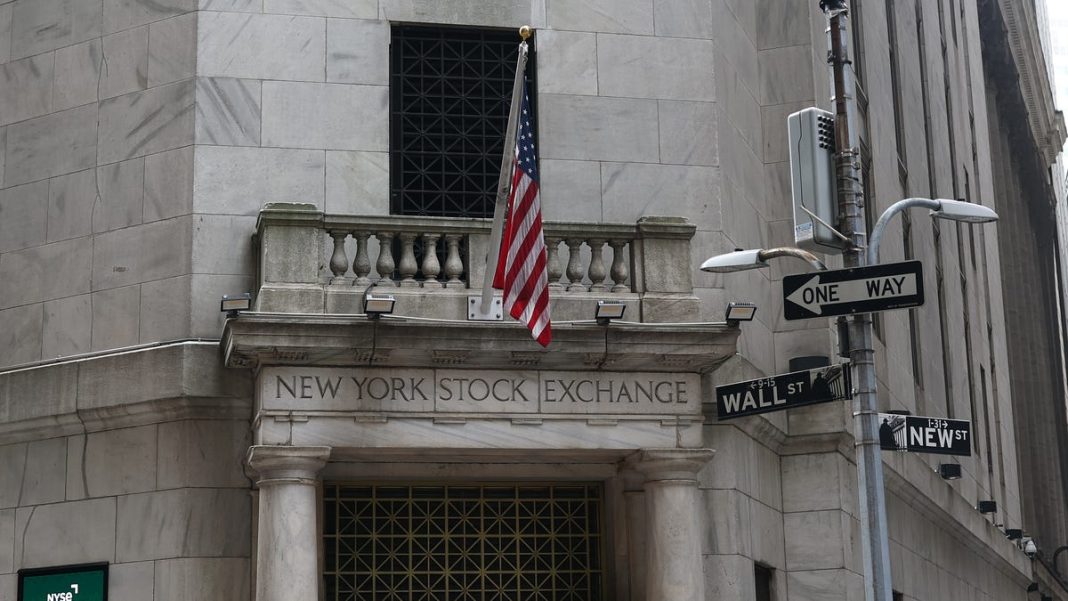US Stocks Rise Despite Tariff Talks; Alphabet’s Sales Fall Short of Expectations
U.S. stock markets closed positively as investors chose to overlook the negative trade rhetoric, viewing it merely as a part of the negotiation process.
In response to President Donald Trump’s 10% tariff on all Chinese imports, China announced tariffs starting Tuesday. They imposed tariffs ranging from 10% to 15% on various U.S. goods, including a 15% levy on coal and liquefied natural gas, and a 10% increase on crude oil, agricultural machinery, and select vehicles, effective February 10.
However, the market reaction to this news was muted, especially after Canada and Mexico postponed their tariffs for at least a month on Monday. Reports suggested that Trump would discuss a tariff pause with Chinese President Xi Jinping on Tuesday, according to White House trade advisor Peter Navarro.
The S&P 500 index rose by 0.72%, gaining 43.31 points to reach 6,037.88. The Dow Jones increased by 0.3%, or 134.13 points, closing at 44,556.04, while the Nasdaq saw a 1.35% rise, up 262.06 points to 19,654.02. The 10-year Treasury yield decreased to 4.517%.
Evaluating the Trade War So Far
Wall Street had a turbulent Monday with Trump’s announcement of 25% tariffs against Canada and Mexico, resulting in a significant sell-off that saw the Dow drop over 600 points at the opening. An outright trade war seemed likely, especially after Canada revealed its own tariffs and Mexico signaled potential responses.
Nevertheless, investor sentiment shifted by the end of the day, and stocks regained much of their lost ground when Mexico decided to enhance border support to defer the tariffs for a month, allowing more time for discussions. Canada followed suit, leading some analysts to interpret Trump’s tariff threats as a strategic bargaining tactic.
Trump’s trade conflict with Canada and Mexico appears to be paused for now, but analysts at Deutsche Bank caution that the dispute with China is fundamentally different.
“China’s recent economic trajectory has shifted away from developing a consumer-focused economy towards a more advanced manufacturing landscape,” they noted. “This has raised concerns in the West as China advances in high-value manufacturing segments. While the U.S. remains the second-largest goods producer, its global market share pales in comparison to China’s, especially as many allied nations face similar declines in their manufacturing sectors over the last three decades. This trend may have spiraled out of control, as access to cheaper imports is no longer a sustainable trade advantage for the U.S., given the economic security risks over production supply chains and technologies being handed to a rival nation.”
This situation implies that “the U.S.-China trade conflict is likely to persist longer than disputes with neighboring countries,” they added.
However, despite this potential for long-term tension, China appears open to negotiations. Reports indicate that talks between Trump and Xi are scheduled for Tuesday.
“Investors seem somewhat doubtful that this is the onset of a full-scale trade war,” commented Hubert de Barochez, senior economist at Capital Economics. “The nearly 2% dip in the S&P 500 on Monday was relatively common in historical context and less severe compared to the early measures of the trade war in 2018. Considering Trump’s tendency to use economic threats for broader objectives, this skepticism is understandable.”
Corporate Updates
With trade concerns taking a backseat for now, investors redirected their focus to corporate news. Highlights from the day included:
- Alphabet, Google’s parent company, announced that while it exceeded earnings expectations for the last few months of the year, its sales fell short. The performance of its cloud computing segment, a key focus area, was also below expectations, leading to a 6.71% drop in shares during after-hours trading. Analysts are expected to discuss AI developments during the earnings call, especially following China’s DeepSeek’s competitive AI model announcement.
- Pepsico reported mixed results for the quarter, with earnings surpassing estimates but sales lagging due to declining demand for snacks and beverages in North America for the fifth consecutive quarter, leading to a 4.5% decline in their shares.
- Estée Lauder revealed plans to cut up to 7,000 jobs and warned of a significant sales decline ahead, resulting in shares plummeting over 16%.
- PayPal surpassed earnings expectations in the final quarter of the year, largely due to a 10% increase in Venmo’s transaction volume. However, investor concern over a shrinking operating margin led to a 13% drop in shares.
- Pfizer exceeded Wall Street’s earnings forecasts for the last quarter, buoyed by sales from COVID-19 products and effective cost-cutting strategies, but their stock dipped by 1.26%.
- Merck also exceeded earnings projections for the fourth quarter thanks to cancer treatment sales, but their 2025 revenue outlook fell below analyst expectations. This drop in forecast, related to the halting of Gardasil vaccine shipments to China until mid-2025, caused shares to drop by 9.07%.
- Palantir’s stock surged 24%, surpassing the $100 per share mark and reaching an all-time high after reporting better-than-expected earnings for the last quarter.
- Amazon is set to release its quarterly results on Wednesday.
Bitcoin Update
Bitcoin continues to be affected by fluctuations in the stock market, recently dropping 3.54% to $97,891.11, dipping below the significant $100,000 mark.
Despite this volatility, some analysts note an underlying optimism for the cryptocurrency during Trump’s presidency.
On Monday, Trump unveiled a U.S. sovereign fund, which has garnered positive feedback as investors view it as a foundation for potential future Bitcoin purchases. Jochen Stanzl, chief market analyst at CMC Markets, remarked, “This demonstrates the continual appetite for risk, even with the negative news surrounding Trump’s tariff policies.”
Medora Lee is a reporter covering finance, markets, and personal finance.

